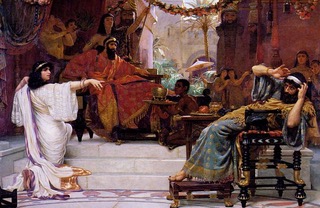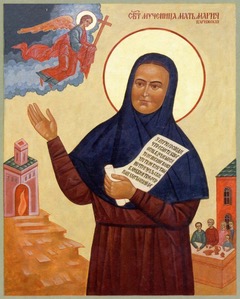 “The End is Near!” proclaims the ubiquitous sign of the doomsday prophet. In the case of Lent Madness 2018, our sign-wielding friend would be correct. Welcome to the Faithful Four. After weeks of learning and voting and debating, the saintly field has been whittled down from 32 to four spiritual heavyweights: Esther, Maria Skobtsova, Anna Alexander, and Richard Hooker.
“The End is Near!” proclaims the ubiquitous sign of the doomsday prophet. In the case of Lent Madness 2018, our sign-wielding friend would be correct. Welcome to the Faithful Four. After weeks of learning and voting and debating, the saintly field has been whittled down from 32 to four spiritual heavyweights: Esther, Maria Skobtsova, Anna Alexander, and Richard Hooker.
As we like to tell our five-year-olds when they join their first soccer team (that’s football for our friends across the pond), “there are no losers, everybody’s a winner.” Of course we’re lying. Thus, while we can sing the praises of these four saintly souls, only one Golden Halo will be awarded.
Today Esther takes on Maria Skobtsova; tomorrow Anna Alexander battles Richard Hooker; and on Spy Wednesday the championship round will take place. For the Faithful Four, we let our remaining Celebrity Bloggers loose as they answer the question “Why should Saint XX win the Golden Halo?” In other words, they’ve been charged with letting us know why their particular saint is so awesome. In this match-up, we have the unique situation of Megan Castellan writing for both Esther and Maria. Oddly enough this is familiar ground for Megan who, in 2015, also had both sides of a Faithful Four matchup in advocating for both Brigid of Kildare and Egeria. Tomorrow Anna Courie is writing for Anna Alexander and Marcus Halley for Richard Hooker.
To make it to the Faithful Four, Esther made it past Lazarus of Bethany, Michael the Archangel, and Peter, while Maria bested Thomas à Kempis, Quiteria, and Martin de Porres. Here’s your chance to send one of these inspiring women off to vie for the Golden Halo.
Esther
 I was introduced to Esther the same way most of us are. She was the pretty, beauty-pageant winner in the book of children’s Bible stories. She seemed glamorous and likable—like the popular cheerleader in high school. It wasn’t until later that I began to see her as a partner-in-crime.
I was introduced to Esther the same way most of us are. She was the pretty, beauty-pageant winner in the book of children’s Bible stories. She seemed glamorous and likable—like the popular cheerleader in high school. It wasn’t until later that I began to see her as a partner-in-crime.
Esther, the only popular biblical heroine who does not fit either the category of mother or reformed prostitute, somehow manages to survive and prosper in a world that sees her at every turn as less than human. Consider the story we know: the king begins his search for a new queen only because Vashti makes the (perfectly reasonable) request to not attend his dinner party so he can show her off. The king picks Esther to marry, not because he loves her, but because she’s the prettiest. So Esther becomes queen, having realized two fundamental things at the exact same time: first, that her worth consists solely in her appearance, and secondly, and most crucially, that will not protect her life from the king’s displeasure.
And yet, in this most dehumanizing situation, Esther steps up and intercedes for her people, valuing their safety and security just as highly as  she prizes her own. In so doing, she became an inspiration and adopted patron to the countless conversos of Spain who were baptized at the end of a sword. Through her aid, they held onto their belief in their own humanity, their faith, and God’s goodness towards them. Esther remained, for them, a sign that God still acted for God’s people even when the truth was shrouded, religion perverted, and all seemed lost.
she prizes her own. In so doing, she became an inspiration and adopted patron to the countless conversos of Spain who were baptized at the end of a sword. Through her aid, they held onto their belief in their own humanity, their faith, and God’s goodness towards them. Esther remained, for them, a sign that God still acted for God’s people even when the truth was shrouded, religion perverted, and all seemed lost.
For us, Esther is an example of faithful leadership. Having made her way into power and privilege, she then uses that privilege in the service of those without it. Esther is a model of leadership through kenosis; a self-emptying leader who risks her life just as she had managed to save it, so that others, too, might be as free as she.
In these turbulent times, may we all be as brave as Queen Esther.
Maria Skobtsova
 Maria Skobtsova was a simple woman, who lived a simple life. She was born in Russia, under the czar, and early on, discovered a passion for art and the life of the mind. She joined the Russian Revolution, but became disenchanted with it soon after.
Maria Skobtsova was a simple woman, who lived a simple life. She was born in Russia, under the czar, and early on, discovered a passion for art and the life of the mind. She joined the Russian Revolution, but became disenchanted with it soon after.
She finally found what she had been searching for in the Church. She studied theology and ultimately took orders as a nun. But what set Maria apart was not her dedication to the church—it was her dedication to the world. When she took her final vows, she required the bishop to make her a promise, that she would never be taken out of the world. For her, serving the people who suffered was the true calling of Christ. That was where she found her greatest call. She frequently ran into trouble with the other nuns and priests she brought to her boarding house in Paris, because she would skip the daily prayers in order to attend to some emergency with someone off the street. She was notorious for her stubbornness, but she persisted, replying “At the Last Judgment I will not be asked whether I satisfactorily practiced asceticism, nor how many bows I have made before the divine altar. I will be asked whether I fed the hungry, clothed the naked, visited the sick, and the prisoner in his jail. That is all I will be asked.”
Maria lived such a dedicated and passionate life that it is difficult to sum it up briefly. She was, above all, clear in her calling and in her purpose, ![]() even when it confused and confounded everyone else, including her own Church. When she found the sick, she nursed them; when she found the homeless, she housed them. When the Nazis began rounding up Jews for deportation, Maria snuck into the Vélodôme d’Hiver in Paris and brought them food, and falsified baptismal certificates. At every point in her life, it was clear that she knew the call of Christ, and nothing, not society, not the church bureaucracy, and not even Hitler’s legions, would stop her from following.
even when it confused and confounded everyone else, including her own Church. When she found the sick, she nursed them; when she found the homeless, she housed them. When the Nazis began rounding up Jews for deportation, Maria snuck into the Vélodôme d’Hiver in Paris and brought them food, and falsified baptismal certificates. At every point in her life, it was clear that she knew the call of Christ, and nothing, not society, not the church bureaucracy, and not even Hitler’s legions, would stop her from following.
Sadly, there were not many following Maria’s path during the Nazi occupation. Far too many Christians chose silence and denial to survive, rather than courageous resistance for the sake of the gospel. Yet Maria shows us just how powerful one person’s act of sacrifice can be. While in the moment, it may seem to have been in vain, if Maria’s life can shine a light for us in our day, then she will have accomplished something magnificent.
[poll id="233"]
180 comments on “Esther vs. Maria Skobtsova”
Mother Megan - could you have made the decision any harder??? This is closer than the KU-Duke game...
“At the Last Judgment I will not be asked whether I satisfactorily practiced asceticism, nor how many bows I have made before the divine altar. I will be asked whether I fed the hungry, clothed the naked, visited the sick, and the prisoner in his jail. That is all I will be asked.” LOVE THIS! Maria gets my vote today.
From my childhood, I loved the story of Esther. She was (and is) an inspiring presence.It's only in recent years that I've been introduced to those like Maria, saints in our own age who stood up to unimaginable evil. Daily carrying out Christ's commands, she showed us the way. Wish she could be here in the midst of the turmoil in our world right now. But then again, there are so many saints among us today. We don't always recognize them. Maria's got my vote.
Maria it is - “At the Last Judgment I will not be asked whether I satisfactorily practiced asceticism, nor how many bows I have made before the divine altar. I will be asked whether I fed the hungry, clothed the naked, visited the sick, and the prisoner in his jail. That is all I will be asked.” Yes!
This was one of the most difficult choices — I admire them both!
Maria in her first round and Maria today. Both very worthy but, my heart said Maria. It has been a wonderful discipline for Lent and I will miss it. Can’t wait for tomorrow.
Such beautiful and moving blog entries today - Congratulations and many thanks, Megan Castellan. I wanted to vote for each candidate. But at last, I had to choose Maria for many reasons but principally for living the call of Christ. How I wish I had that courage and faith.
Sorry, pretty Esther. You can't compare with this:
“At the Last Judgment I will not be asked whether I satisfactorily practiced asceticism, nor how many bows I have made before the divine altar. I will be asked whether I fed the hungry, clothed the naked, visited the sick, and the prisoner in his jail. That is all I will be asked.”
Amen.
Maria Skobtsova for the win!
Maria's quote challenges me where I live. I remember being a little child during WWII, going to Bond Sales, preceded by Community Sings led by my mother, seeing newsreels of the Nazi soldiers goose-stepping through the streets of Europe, listening for Big Ben on the radio as proof that London still stood, but knowing little of what was really going on. Since then, I have met survivors of the Holocaust whom I admire deeply. I wish I were physically able to join my sisters and brothers in marching in our own streets, calling for peace and freedom from fear in our daily lives. However, there are things I can do, and will. I vote for Maria.
I voted for Maria because of her kind charitable works around the world.
Uhhhh .... Much as I respect Esther, I have to say: It wasn't a beauty contest. Viz. 2:13-14. Let's stop propagating that childish fiction. The maidens went in and came out to continue living in the harem. Only 1 was chosen to be queen, i.e. Esther. It needs close reading. But! that said, it's not history. It might even be parody.
The "childish fiction" is more family-friendly than the adult truth of what she was doing with Ahasuerus when she "went into the king" overnight. I would say this was more of a "talent" competition than a beauty one, though being pleasing to the king's eyes didn't hurt.
As to the aftermath what some see as two days of revenge, I have long taken as if you are attacked, you may fight back and won't get in trouble because you fought back and defended yourself. But I haven't gone back and reread Esther all the way through for a few years.
That's my 2¢, your exchange rate may vary.
Oh my goodness! I voter for Esther purely because I was confident that Maria would carry the win... but how to choose between two such strong women of faith?
Esther, whose story of faith and courage I have always loved, is at a disadvantage because there is so much more information on Maria. Nonetheless, I voted for Maria because the clarity of her faith was so compelling. She was really put to the test, and she definitely passed it. Both women are an inspiration and excellent examples of women speaking truth to power using the resources they had at hand. Sorry to have to choose.
Megan, what an outstanding feat! Your summation of these two incredible women's lives and importance made today's voting all the more challenging! Either one is a worthy champion!
Had to go with Maria in this round. As much as I like Esther's story, she is a fictional character. Inspiring, but not quite a saint for me. Maria made a real difference in real people's lives by her courageous and stubborn actions.
Megan, your words are inspirational: "...a model of leadership through kenosis; a self-emptying leader who risks her life just as she had managed to save it, so that others, too, might be as free as she..." Both saints are inspirational, but today I lean in toward Esther.
Maria, Maria, I just met a saint named Maria!
Oops...missed voting on this one, but I would have gone with Maria.